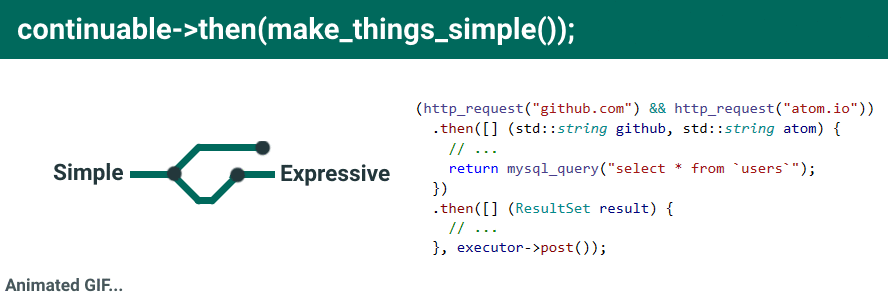Continuable 2.0.0
Zero cost futures now with error handling and co_await support
In version 2.0 the library was heavily improved in multiple ways:
Error handling
Usually it is inconvenient to handle error codes and exceptions in an asynchronous context, as we all know std::future supports error handling through exceptions already. We now introduce this capability to the continuable library while allowing error codes to be used as well.
Consider the function cti::continuable<> get_bad_continuable() which always resolves through an error, then you may handle the error code or exception as following:
get_bad_continuable()
.then([] {
// ... never invoked
})
.then([] {
// ... never invoked as well
})
.fail([] (std::exception_ptr e) {
try {
std::rethrow_exception(e);
} catch(std::exception const& e) {
// Handle the exception here
}
});Abstracting callbacks as promises
Since a callback may be called through an error or result the cri::promise class was added in order ro provide a similar interface to std::promise:
auto http_request(std::string url) {
return cti::make_continuable<std::string>([url = std::move(url)](cti::promise<std::string> /*or auto&&*/ promise) {
// Perform the actual request through a different library,
// resolve the promise upon completion of the task.
promise.set_value("<html> ... </html>");
// ...or promise.set_exception(...);
});
}co_await support
Experimental coroutine (co_await and co_return) support was added, this is available on MSVC 2017 and Clang 5.0.
int i = co_await cti::make_continuable<int>([](auto&& promise) {
promise.set_value(0);
});Minor improvements
The library was improved in other ways:
constexprandnoexceptimprovements- Compile-time improvements
- Documentation improvements
Header split
Since the overall library size was increased the headers were split into smaller chunks.
